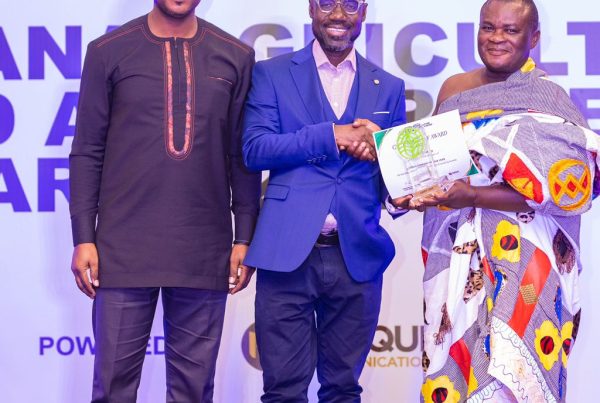This post originally appeared as part of National Geographic’s Digital Diversity Series.
By Sarah Bartlett, Director of Communications and Research at Esoko
Standing in the heart of his pineapple farm in the Central Region of Ghana, Ali Morrison, gripping two mobile phones, tells the story of his most recent sale. Traders came to him offering just .20 Ghana cedis for each pineapple. That’s about 13 US cents. This time around he and his business partner, Isaac Assan, had their mobiles on hand and did a quick SMS price request to Esoko. He sent in the word “pineapple”. He received a list of prices covering the major markets in Ghana.
In the past farmers like Ali and Isaac have had no choice but to blindly accept the prices offered by traders. But the recent and sudden ability to refer to current prices across the country disrupts that whole dynamic. It gives farmers confidence that they didn’t have before, and it takes away the opportunity for traders to lie about prices in faraway markets. Knowing the trader would resell in the capital city’s market for .80 cedis each, Ali wouldn’t budge until he got .40 cedis. He doubled his profits that week, making 400 Ghana cedis instead of 200. That’s US$165 more. And just for the price of a text message.
It’s only until you hear these stories that you can actually wrap your head around the information deficit in rural areas across Africa. Just think for a moment about the amount of information you have at your fingertips everyday. Now slowly take sources out of the mix. Newspapers, magazines, out. Email? Gone. TV vanishes. Both Internet and smartphones disappear. You’re basically left with your neighbors, the radio, and that simple phone. Now imagine trying to make a sale.
Seeing Ali access current prices – like a stock trader accessing Reuters – shows just how powerful information itself can be. Farmers are business people too. But they can’t do good business if they don’t have information. Ali’s story about using Esoko’s SMS prices to increase revenues is not the only one we’ve heard recently. Mobile technology is just beginning to take center stage here, and it’s remarkable to watch.
Back in Accra, the team at Esoko is busy building the technology platform that makes all of this possible. The company itself had very humble beginnings. Just three technicians trying to figure out why no-one had quite cracked what they saw as the biggest riddle out there. With mobile coverage rates in Africa around 60% and at least 60% of the African population making a living through agriculture, why had the two not been addressed together? There seemed to be such an opportunity in that gap.
Esoko’s first steps came then, and it’s been growing ever since. The entire platform revolves around text messaging – using SMS to share information like prices, farming advice, and pick-up points as well as using SMS to gather information like offers, harvest data, and stock levels. All of these tools are managed on Esoko’s web platform, though most users only interact with the system using their mobile phones. The idea is that when individuals and businesses have access to the right kinds of information, supply chains will tighten up. Waste will be reduced. Revenues will increase.
The mobile phone is the key factor that makes Esoko different than other market information systems or services of the past. With mobile, Esoko can tailor specific content to each user. That makes a change from radio. Mobile phones also end up acting as mini-databases – farmers have been saving their SMS messages, trending prices and deciding when to sell. They can save farming advice on their phones for future reference. People in the field are finally given a voice too. They can text in to their association or business partners about a pest infestation or about how much they want to sell. Businesses and projects in turn can actually make decisions based on real-time field data. And being able to track activities throughout an entire supply chain will reduce the risk for factories and mills to invest.
Of course it’s not the mobile phone or the text messages alone that will make the service a success. Esoko simply built a tool using the most appropriate channel (SMS) to move information from one place to the next in rural areas. It’s the information itself that holds the power, and everyone is hungry for more. One huge realization that came along the way was that this tool wouldn’t just be for individuals, but also for businesses and projects to improve communication and efficiencies inside their organizations. So in an interesting twist, Esoko chose a for-profit model. That’s what will make it sustainable, and that’s the best way to ensure the company continue responding to the needs of the market. Charging larger projects and businesses to use the technology also allows Esoko to offer the more simple prices over SMS service to individuals for the cost of a regular text.
Today there are over 60 developers and support staff in Esoko’s Accra office. They write and test software code, design the product, train users, and conduct research on how Esoko is changing market dynamics. There’s great pride in knowing that Ghanaian software has been outsourced to fifteen other countries so far and counting. There’s also a sense of awe and exhilaration knowing that what’s being built here can double the profit of a rural pineapple farmer across town, across the country, or even across the continent. And all through a simple SMS.



